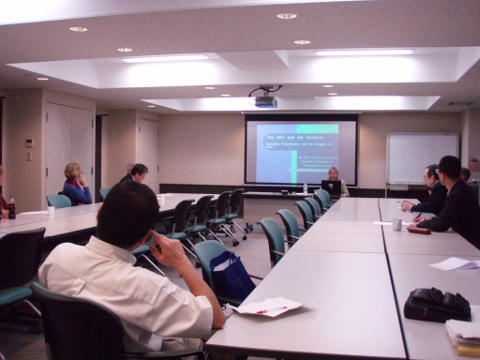The DPJ and their factions
―ideological diversification and the struggle for posts―
April 10, 2009 6:00 PM (finished)
Carmen Schmidt, Ph.D.
(Extraordinary Professor of Political Sociology and Deputy Director of the Japan Research Center at the Faculty of Social Sciences of Osnabrueck University, Germany)
| Date/Time | April 10, 2009 6:00 PM |
|---|---|
| Location | Room 549 5th floor, Akamon Sogo Kenkyuto Institute of Social Science, University of Tokyo [map] |
| Abstract | Currently there is a debate whether Japan's largest opposition party, the Democratic Party of Japan (DPJ) can come into power after the next Lower House election. However, there is no overall study on the DPJ and her internal structure. Based on former party affiliations, the DPJ is divided into eight factions, each headed by party heavyweights. By using surveys on policy positions of party members that were jointly conducted by the University of Tokyo and the newspaper Asahi shinbun, I asked for the ideological distribution within the party and the factions. Further I investigated into the connection between factionalism and the allocation of posts. I found evidence that the ideological diversification within the DPJ is wider than within other parties and that the factions arrange for key members to get party and other posts. With regard to controlling the policy as well as major cabinet posts we thus might predict intensifying of factionalism if the party will become the governing party. In the same manner as the LDP factions, the factions of the DPJ may become "parties within the party", posing a major threat to the unity of the party over the pace of time. |
| Bio | Apl. Prof. Dr. habil. Carmen Schmidt is Extraordinary Professor of Political Sociology and Deputy Director of the Japan Research Center at the Faculty of Social Sciences of Osnabrueck University (Germany). Her research specialization lies in the field of social change and the transformation of political systems in a comparative perspective, with an emphasis on social cleavages, voting behavior and public opinion, political leadership, and political institutions. Her publications include "Social Structure and Political System in Japan: Social Cleavages, Voter Alignment, and Political Representation" (published in German 2001), the "Dictionary of Contemporary Japanese Politics: Japanese - German",( published in 2003) and "Japan's Circle of Power: Legitimacy and Integration of a National Elite" (in German, 2005). Currently, she is JSPS- Visiting-Professor at Hitotsubashi University. |

